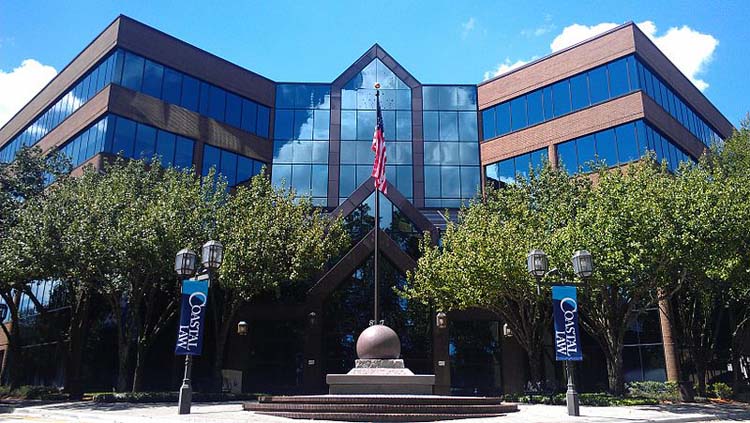Still out of compliance with ABA standards, Florida Coastal is investigating a response

Florida Coastal School of Law/Wikimedia Commons.
Florida Coastal School of Law remains out of compliance with ABA accreditation standards regarding admissions and its legal education and academic support programs, according to an accreditation committee decision made after a March hearing.
The ABA Section of Legal Education and Admissions to the Bar in an Oct. 12 letter informed the law school that the committee found it to be out of compliance with:
- Standard 301(a), which states that law schools must have a rigorous program to prepare students to pass a bar exam and practice law.
- Standard 309(b), which addresses academic support to give students a “reasonable opportunity” to complete their studies and become lawyers.
- Standard 501, sections (a) and (b). The first part directs that accredited law schools have sound admissions policies, while the second part mandates that people who don’t appear capable of graduating from law school or passing a bar exam should not be admitted as students.
- Interpretation 501-1, which discusses factors to consider in admissions.
The March public notice states that Florida Coastal has come into compliance with Standard 501(a). For the other standards, the committee directed the law school to develop a reliable plan, including admissions data and methodology, and said that a fact finder will be appointed by the managing director of the ABA Section of Legal Education and Admissions to the Bar.
Scott DeVito, Florida Coastal’s dean, told the ABA Journal that they are not accepting students with LSAT scores below 145. The school’s spring 2018 class had a median LSAT score of 150 and the class’s 25th percentile LSAT score was 147, according to DeVito, who would not disclose what the school submitted for the accreditation committee hearing.
According to the law school’s Standard 509 Information Report for 2017, its 25th percentile LSAT score was 145, and its median LSAT score was 148. Among the first-year class, 25.7 percent of students left through nontransfer attrition.
In an email to students last Friday, DeVito wrote that he and Dennis Stone, the law school’s president, are investigating a response to the accreditation committee decision, which can be appealed. The email also mentions the law school’s February 2018 Florida bar passage rates. Eighteen of the 29 graduates who took the bar passed.
“While I am pleased with the ABA Committee’s findings relative to Standard 501(a), I am troubled by the ABA’s decision to find us to be out of compliance with other standards,” DeVito wrote. “This is all the more troubling given our recent bar pass results in Florida (above the state average, fourth out of 11 in the state) and that our Spring 2018 entering credentials are at or above 52 other law schools. It is also inconsistent with the precedent the ABA committee has created with regard to other law schools it has found back in compliance. Moreover, the ABA provided us late notice of its findings.”
Since October, the section has published information about nine schools, including Florida Coastal, that the accreditation committee found to be out of compliance with the standards. Out of those schools only Western Michigan University Thomas M. Cooley Law School was found to have come back into compliance, according to a decision announced in a accreditation committee notice in March. The finding followed a lawsuit filed by Cooley against the ABA, which according to PacerPro documents remains open.
San Diego-based Thomas Jefferson School of Law, another of the nine schools found to be out compliance by the committee, was placed on probation by the section’s council last November.



